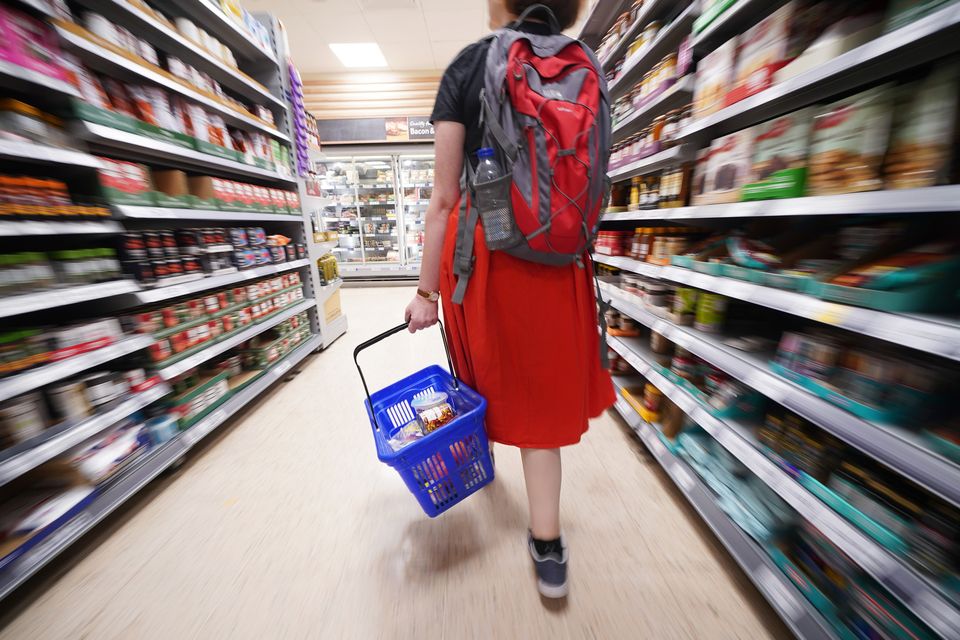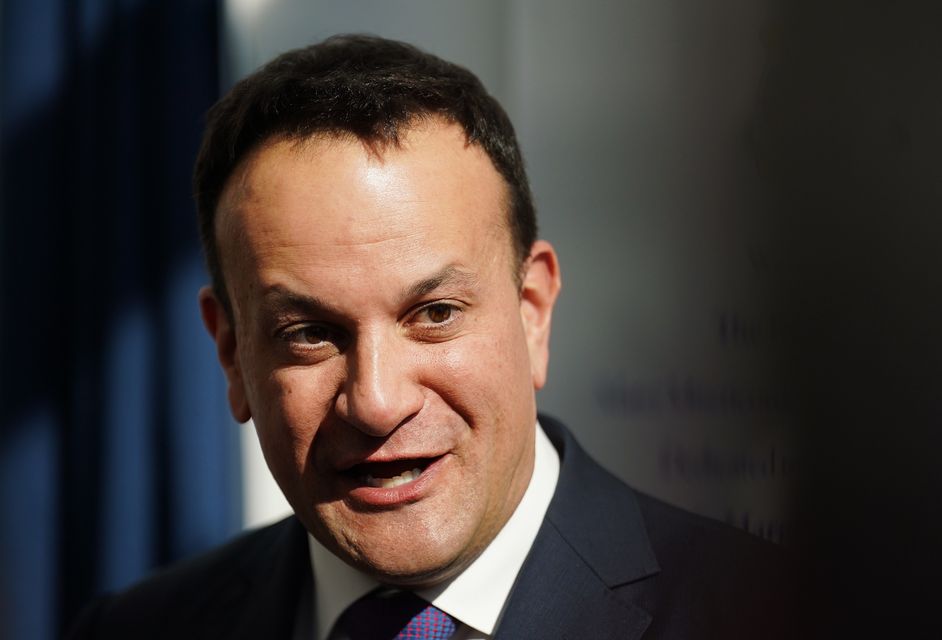Aldi follows Tesco in cutting price of own-brand bread in latest salvo in supermarket price war
Move comes as Taoiseach Leo Varadkar tells Dáil the State’s consumer watchdog has recommended against grocery price controls despite claims of price gouging
Stock photo: PA — © Yui Mok
Aldi has confirmed that it will follow Tesco and also cut the price of its own-brand bread in the latest salvo in what is becoming a price war over own-brand supermarket staples.
This price reduction, which will come into effect from tomorrow, will see Aldi’s sliced pans loafs reduced by 10c each to 89c for white bread, 99c for brown bread and €1.09 for white Mega-Toast respectively, while its White/Wholemeal Half pan will be reduced from 89c to 85c.
Aldi said it reviews the market on a daily basis and will continue to reduce prices “where and when it can”.
Group managing director Niall O’Connor said “where input costs improve, for us and our suppliers, we will respond”.
"Our commitment to Irish shoppers is to always have a discount versus the more expensive full price supermarkets on a basket of goods or the weekly shop,” he said.
“That will not change. We monitor prices and market factors on a daily basis, and our real-time focus means we can respond quickly.
“As we outlined once again at today’s meeting of the Retail Forum, the environment remains challenging. Our response to the challenging backdrop remains multi-dimensional—shielding customers, working with suppliers, always having a discount versus the larger supermarkets, and monitoring the market in real time”.
The move follows Tesco Ireland’s announcement earlier today in which it said it would reduce the retail price on its own-brand bread by 10 cent.
This comes after several competitors cut the prices of milk and butter last week.
From tomorrow, May 11, Tesco own-brand 800g white sliced pan will now be priced at 89c, down 10c from 99c. Corresponding reductions will apply to all other Tesco own-brand sliced pans.
Read more
Tesco Ireland chief executive Natasha Adams said: “It’s been an incredibly tough year for many of our customers, and we have been determined to try and alleviate that pressure.”
She added that the company is “extremely conscious” of the cost-of-living challenge that their customers are experiencing, “which is why we are moving to reduce the cost of another daily staple”.
“Following our reduction in butter and retail milk prices in recent days, we are investing in bread retail prices to help customers with their household costs,” she said.
Tesco Toaster White Thick Sliced bread will drop from €1.19 to €1.09, while Tesco Family Brown Sliced Pan will drop from €1.09 to 99c.
It is the latest move by an Irish retailer as they try to maintain market share, which could see the price of grocery staples fall further amid a price war.
We know certain companies are milking it – and government is doing nothing about that
Four supermarkets – Tesco, Aldi, Lidl and SuperValu - last week cut the price of a 454g pack of butter, following cuts to the price of their own-brand milk.
They also announced that the price of two litres of milk would drop by 10 cents.
While the move was welcomed by consumer advocates, farmers warned of a “price war” and said they are near breaking point as a result of the cuts.
Taoiseach Leo Varadkar said prices had not fallen in line with inflation (Brian Lawless/PA) — © Brian Lawless
The price war that has broken out comes at a time when grocery price inflation has been at record levels. The latest cut comes after a period of price hikes – where a year’s supply of butter for a household buying one 454g packet a week has shot up by €63.
Grocery price inflation may have slowed for the first time in two years, but prices are still rising in double digits. Shoppers in Irish supermarkets paid 16.6pc more for goods in the 12 weeks to mid-April, compared with the same period last year, according to research group Kantar.
However, price caps on grocery items have been ruled out by the Competition and Consumer Protection Commission (CCPC) – despite galloping grocery costs.
The watchdog — branded “toothless” today by Social Democrats leader Holly Cairns – had delivered preliminary advice to the Government after it asked the CCPC to examine price controls as a possible power to curb supermarket “greedflation”.
“We know certain companies are milking it – and government is doing nothing about that,” Ms Cairns said, adding that junior minister Neale Richmond would be “wagging his finger” at the multiples in a meeting of the Retail Forum today. But he had no powers if his calls are ignored, she said.
The Taoiseach revealed the CCPC’s reply to the Dáil, after being asked about it by Sinn Féin leader Mary Lou McDonald.
“It’s only a page and a half (long),” Leo Varadkar said of the expensively-established and funded state body.
“In the advice, they caution strongly against introduction of price controls,” he said.
“They point out for example, that in Spain, proposals (for price controls) were abandoned because of the impact that would have on small retailers and those in rural areas in particular.”
The latter require higher margins to get by, because of their isolation, he said.
The CCPC also cites a “lack of evidence” that price controls in France and Greece have actually helped consumers.
Mr Varadkar said the body had also highlighted “the unintended consequence that if you control some prices, other prices that are not controlled get put up even more”.
There was also the possibility of products being unavailable, and of shortages, under the CCPC’s advice, he said.
The watchdog was, as a result, “very much cautioning against that approach,” Mr Varadkar said, while agreeing that there “is profiteering” in the sector.
“I have nothing against companies making profits, but we tax the profits, and they shouldn’t be out of line,” he added.
The CCPC had the power to launch investigations of its own into price-fixing or price-signalling, or other cartel-like behaviour.
Ms Cairns said that Dunnes Stores, Lidl and Tesco did not disclose their Irish profits. But she said Aldi had done so for 2021 – and its Irish operation was 71pc more profitable than its British stores.
Social Democrats leader Holly Cairns. Photo: Collins — © Collins Dublin, Gareth Chaney
Paul Murphy of People Before Profit said EU research indicated that two-thirds of price increases in the grocery sector was profiteering. He said price controls could be introduced under legislation.
Mr Varadkar: “We will only take an action like that if we are convinced they will benefit consumers. There is ideology – and then there is reality.
“The Government is under no illusions. We acknowledge that we're experiencing a period of hyperinflation. People saw that in their energy bills first. Thankfully, now we're seeing petrol and diesel come down. I think we'll see electricity and gas come down in the coming months as well.
“Energy inflation feeds into the cost of food, the cost of production, and the cost of doing business – and as a result of that, families are seeing a big increase in their grocery bills in the cost of the weekly shop.”
He said of the CCPC: “They have powers under law to investigate price-fixing, price-signalling and cartel-related behaviour.
“They don’t require an instruction to investigate that. We have written to them already.”
Mr Richmond was meeting with the retail forum today, involving the major retailers, supermarkets and the representative bodies, he said.
“He'll be giving them a very clear message on behalf of the Government. That is - when your input costs went up, you increased your prices. Now your input costs are going down. We expect to see you reduce your prices,” he said.
“That's the message they’re going to get very clearly from Mr Richmond today.”
The CCPC had said there was no evidence of an emergency or market failure in the retail grocery sector and warned the Government against introducing price caps on food.
In a briefing note for Enterprise Minister Simon Coveney, it said it recognises supermarket price increases have had a “significant impact on consumers” and noted governments have decided to respond with targeted income support for those hardest hit.
However, it added: “the CCPC has not seen any evidence or analysis to support the suggestion that an emergency or market failure exists in the retail grocery market and that price controls would provide consumer benefits.”
The watchdog said in a “state of emergency” such as when there are shortages of certain goods, Governments may intervene to set prices or ration certain products.
“Price controls clearly have a role in certain circumstances e.g. when regulating a network monopoly. In addition, there may be circumstances where an emergency means goods are scarce e.g. natural disaster, and temporary price controls provide real consumer benefits,” it said.
“The decision to do this can only be taken by the Government and such regulations require careful design,” it added.
The State agency also noted the European Commission insists that, if a Member State decides to regulate prices, they be set by the Government rather than the retailers.
“Such regulations must ensure not to offset the price environment and breach internal market rules on competition,” it said.
Meanwhile, Labour’s spokesperson on finance Deputy Ged Nash has accused the government of being “all mouth and no trousers” when it comes to tackling inflated prices at the supermarket checkout, in the wake of today’s meeting of the Retail Forum.
Deputy Nash said government action is needed to bring grocery prices down.
“When I challenged the Taoiseach on the issue, two weeks ago, he thought he could simply wave the problem away with a vague promise that inflation will start to fall and that will eventually be reflected on the supermarket shelves,” he said.
“If he was that confident the supermarkets and giant food producers would act responsibly and pass their falling costs on to consumers, you would wonder why we had this media showcase meeting of the Retail Forum today.
“The government seems more concerned with appearing to do something about this issue rather than actually acting on it and using the tools it now belatedly admits are in its armoury, to bring prices down at the supermarket checkout.
“The government is obliged to intervene where a market fails and I would suggest that if supermarkets are trying to maintain the extraordinary profits they made during the height of the pandemic by artificially inflating their prices as their input costs go down, this market has failed.
“We need a serious analysis from the CCPC on pricing in the grocery sector and we need the giant supermarkets to be more transparent on their profits.”
















